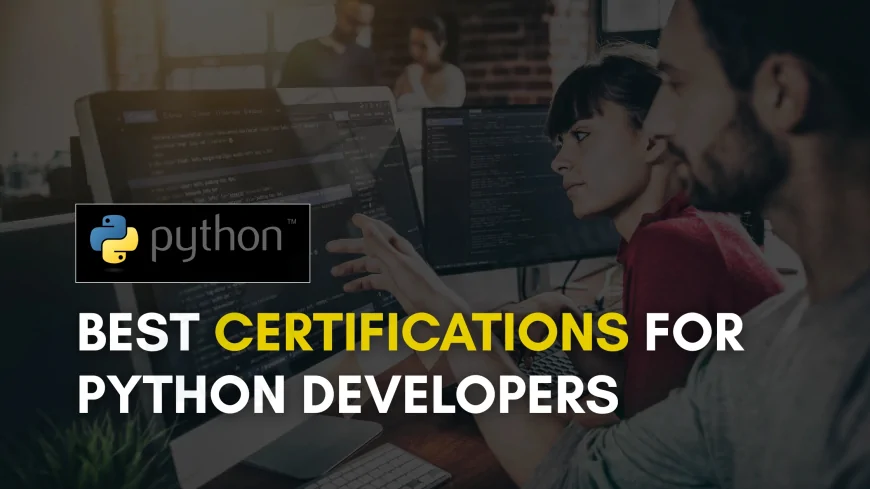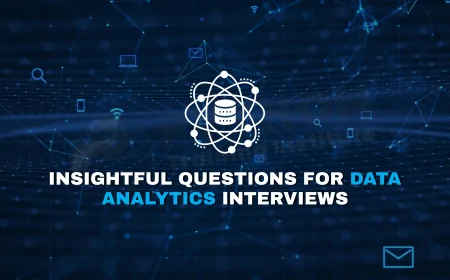Top Certifications for Python Developers to Boost Your Career in 2025
Discover the best certifications for Python developers in 2025 to advance your career in web development, data science, and automation. Learn how Python training in Pune can prepare you for industry-recognized credentials and real-world success.

In today’s fast-evolving tech world, Python has become a dominant programming language across domains such as web development, data science, AI, automation, and cybersecurity. As the demand for Python developers grows, certifications have emerged as a reliable way to validate your skills, stand out in a competitive job market, and accelerate your career progression. But with countless options out there, a common question arises—what certifications are best for Python developers?
Let’s explore this question in depth by examining different types of Python certifications, how they align with career goals, and what makes them truly worthwhile for developers of all levels.
Why Python Certifications Matter
Before diving into specific certifications, it's essential to understand why earning one can be a smart move:
-
Validates Your Skills: Certification acts as third-party proof that you have mastered certain technical skills.
-
Boosts Employability: Employers often shortlist candidates with relevant certifications, especially for junior roles.
-
Career Advancement: Certifications can support internal promotions or transitions into specialized roles.
-
Freelancing & Consulting: Clients trust certified professionals more, especially in competitive gig marketplaces.
-
Structured Learning Path: Preparing for certification forces you to learn systematically and fill knowledge gaps.
Choosing the Right Python Certification
The best certification depends on factors like your current skill level, career goals, specialization, and time commitment. Below are some of the top categories of certifications that serve different purposes for Python developers.
1. Foundational Python Certifications
These certifications are ideal for beginners or those new to programming. They focus on basic syntax, control structures, functions, and data structures.
Key Topics Typically Covered:
-
Variables and data types
-
Conditional statements and loops
-
Functions and scope
-
Lists, dictionaries, sets, and tuples
-
File input/output
-
Basic error handling
Why It’s Valuable:
Foundational certifications are perfect for individuals looking to break into software development or switch from another field. They establish your core competency and prepare you for more advanced certifications.
2. Intermediate Python Programming Certifications
After mastering the basics, intermediate certifications take you further into real-world applications and advanced language features.
Key Topics Include:
-
Object-oriented programming (OOP)
-
Modules and packages
-
Generators and iterators
-
Comprehensions and decorators
-
Exception handling
-
Virtual environments and dependency management
Who Should Consider:
Those with 6 months to 2 years of Python experience who want to validate their intermediate knowledge and showcase readiness for development roles.
3. Data Science with Python Certifications
Data science has been one of the biggest driving forces behind Python’s popularity. Certifications in this domain focus on libraries, data manipulation, and analytical workflows.
What You’ll Learn:
-
NumPy for numerical operations
-
Pandas for data wrangling
-
Matplotlib and Seaborn for visualization
-
Scikit-learn for machine learning basics
-
Exploratory Data Analysis (EDA)
-
Working with datasets (CSV, Excel, APIs)
Unique Value:
These certifications prove that you not only understand Python but also know how to use it in a data-centric workflow—essential for roles in analytics, data science, and machine learning.
4. Machine Learning and AI Certifications Using Python
For those who aim to work on intelligent systems, machine learning (ML) and artificial intelligence (AI) certifications are excellent choices.
What They Cover:
-
Supervised and unsupervised learning
-
Neural networks and deep learning
-
TensorFlow, PyTorch, or Keras basics
-
Model evaluation and tuning
-
Natural Language Processing (NLP)
-
Image processing with OpenCV
Who Benefits Most:
Developers looking to build intelligent solutions or shift into AI-focused roles can use these certifications to gain specialized expertise and credibility.
5. Python for Web Development Certifications
Python’s role in web development is largely driven by frameworks like Django and Flask. These certifications focus on backend web development using Python.
Topics Included:
-
Web routing and URL mapping
-
Database handling with ORM
-
Creating RESTful APIs
-
Authentication and authorization
-
Deployment practices
When to Choose:
If your goal is to become a backend web developer or full-stack Python developer, this is a smart path. Certifications in this category highlight your ability to build dynamic and secure web applications.
6. Automation and Scripting with Python Certifications
Python excels at automating repetitive tasks and handling system-level scripting, making it ideal for IT professionals, DevOps engineers, and QA testers.
What You Learn:
-
Automating file and folder operations
-
Web scraping with BeautifulSoup or Selenium
-
Task scheduling and cron jobs
-
API interactions using requests module
-
Shell scripting integration
Career Relevance:
This type of certification is particularly helpful for sysadmins and testers who want to streamline tasks using Python and add efficiency to their workflows.
7. Cybersecurity and Ethical Hacking Certifications with Python
Python plays a significant role in penetration testing, malware analysis, and cybersecurity automation.
Skills Covered:
-
Network scanning and packet sniffing
-
Writing basic exploits
-
Analyzing log files
-
Security tool scripting
-
Basic encryption and hashing
Standout Advantage:
Certifications in this domain distinguish you in a niche, high-demand field where Python can be a powerful tool for ethical hacking and digital forensics.
8. Python Developer Role-Based Certifications
Some certification paths are designed to simulate real job roles. They test your ability to solve real-world problems as a Python developer.
Role-Based Certification May Include:
-
Building complete apps using Python
-
Writing clean, modular, and testable code
-
Using version control (Git)
-
Debugging and troubleshooting
-
Deploying Python applications
Why It’s Effective:
Rather than just testing theoretical knowledge, these certifications validate your job readiness through practical assignments and projects.
9. Project-Based Python Certification Programs
Unlike traditional tests, project-based certifications require you to complete several real-world projects to demonstrate mastery.
Common Project Examples:
-
Web scraping dashboards
-
To-do apps with Flask/Django
-
Data analysis of public datasets
-
Chatbots using NLP
-
Automation of file systems or APIs
Differentiator:
Project-based certification allows you to build a portfolio that hiring managers can actually review—making it far more impactful than paper-based tests.
10. Open-Source Contribution Certifications
Some certification tracks involve contributing to real Python projects on platforms like GitHub. These aren’t traditional exams but provide a different kind of credibility.
What They Offer:
-
Learning Git workflows
-
Participating in open-source communities
-
Fixing bugs and submitting pull requests
-
Writing test cases and documentation
Career Impact:
These certifications show initiative, teamwork, and real experience—qualities that employers value highly in Python developers.
Factors to Consider Before Choosing a Python Certification
To choose the best certification for your situation, consider the following:
Career Goal Alignment
Are you aiming for a job in data science, automation, or web development? Choose certifications that specialize in your desired field.
Current Skill Level
If you're just starting out, avoid jumping into advanced certifications. Begin with foundational or intermediate-level options and scale up.
Time Commitment
Some certifications can be completed in a weekend, while others may require months of study and project work. Choose one that fits your schedule.
Practical Components
Look for certifications that include coding exercises, quizzes, or real-world projects. These help reinforce learning and demonstrate applied skills.
Industry Recognition
Some certifications are recognized globally, while others are more niche. Choose based on the employers or roles you’re targeting.
Certifications vs Experience: Which Matters More?
Certifications provide a formal way to validate your skills, but they are not a replacement for actual coding experience. Ideally, a combination of both works best:
-
Certifications prove you know the theory.
-
Projects show you can apply it in the real world.
Use certifications to open doors and real experience to walk through them.
Advantages of Multiple Certifications
Earning multiple certifications can benefit you by:
-
Showing a breadth of knowledge (e.g., web + data)
-
Reinforcing learning through repetition
-
Creating more job opportunities
-
Offering better freelance profile ratings
-
Increasing confidence in applying for higher-level roles
However, avoid chasing too many certifications at once. Focus on quality and relevance to your goals.
Common Myths About Python Certifications
“Certifications guarantee a job.”
They boost your profile, but interviews and real-world coding skills still matter most.
“Only expensive certifications are valid.”
There are many affordable or even free certifications that are highly respected in the developer community.
“You need a computer science degree to get certified.”
Most certification programs are open to everyone and don’t require prior academic qualifications.
How to Prepare for Python Certification Exams
Here are some tips to prepare effectively:
-
Follow an organized study plan.
-
Practice with sample questions and coding challenges.
-
Use real-world datasets and problems for practice.
-
Join online coding forums and communities.
-
Review official documentation and tutorials.
-
Build mini-projects as part of your revision.
Which Certification Is Best for You?
There’s no one-size-fits-all answer. The best Python certification depends on your current stage, end goal, and learning preference. Whether you're a beginner wanting a solid foundation, a data enthusiast chasing analytics roles, or a seasoned coder branching into AI, there's a certification track tailored to your ambitions.
Don’t just collect certificates—use them as launchpads to build real projects, solve problems, and level up your developer journey.
FAQ's
What are the best certifications for Python developers starting out?
For beginners, foundational Python certifications are ideal. These typically cover core syntax, data types, loops, and functions. Enrolling in a Python training institute in Pune can help beginners gain hands-on experience while preparing for such certifications through structured guidance and project-based learning.
Is Python certification helpful for getting a job in Pune?
Yes, a Python certification significantly boosts job prospects in Pune’s thriving tech industry. It validates your skills and can increase your chances of landing interviews, especially in roles like software development, data analysis, and QA automation.
Which Python certifications are best for data science careers?
Certifications that include NumPy, pandas, Matplotlib, and machine learning libraries are best for aspiring data scientists. Training institutes in Pune often provide data-centric Python certification paths with hands-on projects, making them highly effective for real-world readiness.
Can I get a job after completing a Python certification course in Pune?
Absolutely. Completing a Python certification through a reputed training institute in Pune often includes placement support, interview preparation, and real-world project experience—making you job-ready in fields like backend development, automation, and data analytics.
How long does it take to complete a Python certification course in Pune?
Most Python certification programs in Pune can be completed in 6 to 12 weeks, depending on the learning format. Fast-track and weekend options are also available, especially for working professionals aiming for quicker certification.
What makes a Python certification course valuable?
A valuable Python certification course includes a clear curriculum, hands-on projects, live coding sessions, assessments, and mentorship. Institutes in Pune offering such features help learners not just pass exams but also gain real development experience.
Are there role-based Python certifications available in Pune?
Yes, some training institutes in Pune offer role-based Python certifications focused on web development, automation, or data science. These paths mimic industry job roles and include practical projects to prepare you for specific career tracks.
What certifications should Python developers pursue for AI and ML?
Python developers interested in AI and ML should go for certifications that include TensorFlow, Scikit-learn, and deep learning frameworks. Pune-based training institutes often provide these advanced modules with live projects and capstone challenges.
Is a Python web development certification worth it?
Yes, especially if it includes Django or Flask training, REST API creation, and deployment. Web development certifications from Pune-based programs help you build full-stack applications, making you highly employable as a backend or full-stack developer.
Do Python certifications include real-time projects?
The best Python certifications in Pune do. Real-time projects are essential for mastering concepts and building a portfolio. These often include data analysis, automation scripts, and web app development projects that simulate real-world challenges.
Can I prepare for Python certifications online in Pune?
Yes, many institutes in Pune offer flexible online Python training with interactive sessions, recorded videos, project work, and doubt-clearing sessions—ideal for working professionals or remote learners seeking certification.
What certifications help Python developers get freelance work?
Certifications that include project-based learning and real-world applications are preferred by clients on freelance platforms. Training in Pune often includes freelance-oriented modules that help learners demonstrate skills in their portfolio.
Is it necessary to have a degree for Python certification?
No, a degree is not required. Anyone interested in learning Python can enroll in certification courses. Institutes in Pune accept students from diverse backgrounds and help them transition into tech roles through practical learning.
What’s the difference between beginner and advanced Python certifications?
Beginner certifications focus on syntax and logic, while advanced ones cover OOP, APIs, automation, and frameworks like Django. Pune-based institutes often offer both levels and guide learners from basic programming to specialization.
Do Python certifications include placement assistance in Pune?
Many Python training institutes in Pune offer placement assistance, resume building, interview preparation, and referrals to hiring partners. This support helps learners transition smoothly from training to employment.
Can I get certified in Python while studying in college in Pune?
Yes, several institutes in Pune offer flexible schedules suitable for students, including weekend or evening batches. Early certification can give students a competitive edge and make internships more accessible.
Are there fast-track Python certification courses available in Pune?
Yes, fast-track certification courses are available, especially for those who already have some coding background. These intensive programs in Pune aim to complete certification in as little as 4 to 6 weeks with focused learning.
What certifications are good for automation using Python?
Certifications focusing on scripting, task automation, and tools like Selenium or requests are ideal. Institutes in Pune often offer automation-focused tracks that include real-world use cases like web scraping or system scripting.
What kind of job roles can I apply for after Python certification?
You can apply for roles like Python Developer, Data Analyst, Automation Engineer, Backend Developer, or Junior ML Engineer. Certifications from Pune-based training programs are widely recognized by tech companies and startups alike.
How to choose the best Python certification course in Pune?
Look for courses with an updated syllabus, experienced mentors, real-time projects, reviews, and placement support. Compare curriculum depth and flexibility before enrolling to ensure it matches your goals and timeline.
Accelerate Your Python Journey with the Right Certification
Python certifications can be your stepping stones to a high-growth career. They help you gain confidence, structure your learning, and stand out in the job market. Whether you're eyeing data science, machine learning, automation, or full-stack development, there's a path for you.
Choose your certification wisely, stay consistent in your learning, and don’t forget—what truly counts is your ability to apply Python in solving real-world problems.
What's Your Reaction?
 Like
0
Like
0
 Dislike
0
Dislike
0
 Love
0
Love
0
 Funny
0
Funny
0
 Angry
0
Angry
0
 Sad
0
Sad
0
 Wow
0
Wow
0















